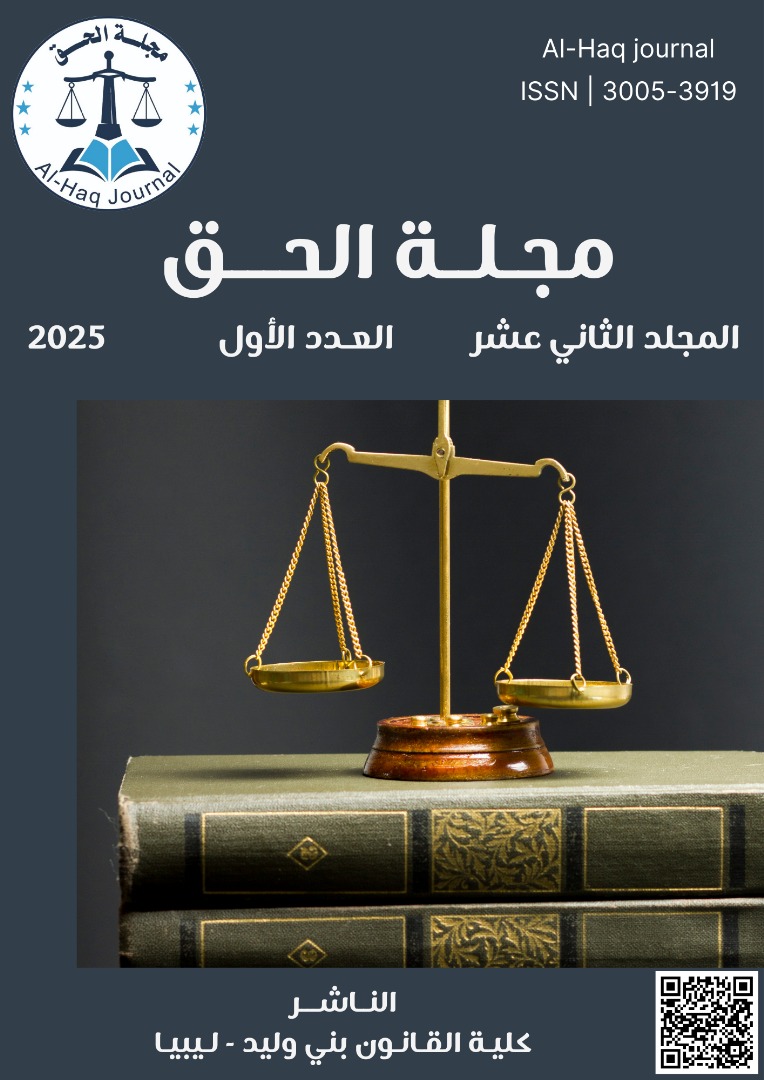Management of Waqf Funds in Libyan Law
DOI:
https://doi.org/10.58916/alhaq.v12i1.289Keywords:
Management of endowment funds, Endowment Authority, dismissal and accountability of the supervisor, supervisor’s job.Abstract
Endowed funds require someone to preserve, care for, and manage their affairs in terms of exploitation, whether that is represented by construction, rent, or distributing the proceeds to those entitled to them, protecting them from others, preventing any aggression against them, and claiming all their rights, regardless of their hand and wherever they are found. All of this is in order for the endowment to continue for the purpose for which it was established. Therefore, it is inconceivable that an endowment could exist without a guardian. The person in charge of establishing the endowment is called the supervisor, the guardian, or the trustee. This research aims to identify and reveal the management of endowment funds through legal texts in Libyan law and sometimes compare them with other rules of Egyptian law or rules of Islamic jurisprudence in order to enable us to reveal the practical obstacles to these texts and strive to find sound practical texts that preserve endowment funds, protect them from danger and achieve sustainable development. Accordingly, I addressed the concept of endowment management in the first section and who has the authority to oversee the endowment, then to study the removal of the supervisor and his accountability. As for the second section, it was devoted to addressing the function of the supervisor, whether it was represented by renting, borrowing, or building and developing the endowment. Then the conclusion came guided by some results and recommendations to preserve endowment funds from tampering and loss.
Downloads
References
Al-Munir Ahmad Salim Luka, Waqf Rulings: A Comparative Jurisprudential Study in Light of the Waqf Law in Libya, University of Zawiya, 2010.
Al-Rahuni, Al-Zarqani's Commentary on Khalil's Mukhtasar, with a Marginal Commentary by Al-Madani on Aknoun – Photocopied from the 1366 AH (1978) edition of the Amiri Press in Bulaq, Dar Al-Fikr, Beirut, first edition, 1978.
Al-Kharashi, Ali Khalil's Mukhtasar, with a Marginal Commentary by Sheikh Ali Al-Adawi, Dar Al-Fikr for Printing, Publishing, and Distribution.
Ibn Abidin, A Commentary on Rad Al-Mukhtar's Commentary on Al-Durr Al-Mukhtar, entitled Ibn Abidin's Commentary on the Jurisprudence of Abu Hanifa Al-Nu'mani, Dar Al-Fikr for Printing, Publishing, and Distribution, 1399 AH – 1979 AD edition.
Abu Ishaq Burhan al-Din ibn Muhammad ibn Muflih, who died in 884 AH, "The Innovator in Explaining al-Muqni'," Islamic Office.
Ashraf Juma Muhammad Nasr, "Cash Waqf and Its Role in Financing in Light of the Singapore Experience in Developing Waqf in Libya," PhD Thesis in Islamic Banking and Finance, International Islamic University, 2020.
Ismail Abdullah Ahmad Qaratam, "Libyan Waqf Administration and the Regulatory Reality Over It," Journal of Al-Zahr University, Faculty of Sharia and Law, Assiut, Issue (35), Second Issue, Part One, April 2023.
Taqi al-Din Muhammad ibn Ahmad al-Futuhi al-Hanbali, known as al-Najjar, "The Ultimate Administration in Compiling al-Muqni' with Revision and Additions," edited by Abdul-Ghani Abdul-Khaliq, Dar al-Uruba Library, Cairo, Arab Republic of Egypt. 9. Jumaa Mahmoud Al-Zariqi, The Status of Waqf in Islamic Civilization, Center for Research, Studies, and Training, College of Medical Technology, Misurata, 2014.
Jumaa Mahmoud Al-Zariqi, The Development of Waqf Objects and the Differences in Its Methods, Ancient and Modern (with a Case Study from Libya), The Five Jurisprudential Issues of Waqf Forum, Turkish Religious Affairs and the General Directorate of Turkish Endowments, Istanbul, Turkey, 2011.
Zain Al-Din bin Nujaym Al-Hanafi, "Al-Bahr Al-Ra'iq Sharh Kanz Al-Daqa'iq," Dar Al-Kitab Al-Islami, Cairo, second offset edition.
Sharaf Al-Din Musa Al-Hajjawi Al-Muqaddas, Judge of Damascus, "Al-Iqna' fi Fiqh Al-Imam Ahmad, Edited and Commented by Abdul Latif Muhammad Musa Al-Subki," Dar Al-Ma'rifa for Printing and Publishing, Beirut, Lebanon. 13. Abdullah Al-Tayeb Zawita, Managing Waqf Investments in Libya (Challenges and Solutions), Master's Thesis, International Islamic University Malaysia, Department of Islamic Banking and Finance, Institute of Islamic Banking and Finance, 2020.
Abdul Razzaq Boudiaf, Managing Waqf Funds and Means of Their Investment in Islamic Jurisprudence and Law, Dar Al-Huda for Printing, Publishing, and Distribution, Algeria, 2010.
Abdul Moneim Salem Al-Dali, The Reality of Waqf Management and Investment in Libya, PhD Thesis, Sunan Ampel Islamic University, Surabaya, Indonesia, 2018.
Arshid Al-Alawin's Fatwa, Hereditary Waqf and Its Contemporary Applications (A Comparative Jurisprudential Study), PhD Thesis, International Islamic University, Amman, Jordan, 2011.
Faisal Habtoush, Partnership Media, Khost Advertising Foundation, Amman, Jordan, 2007.
Kamal Al-Din Muhammad bin Abdul Wahid, known as Ibn Al-Humam Al-Hanafi, who died in the year 681 AH, "Explanation of Fath al-Qadir, on al-Hidayah, Explanation of Bidayat al-Mubtadi", by Sheikh Burhan al-Din Ali ibn Abi Bakr al-Marghinani, who died in 593 AH.
Kamal Mansour and Ali Khalfi, Administrative Reform of Endowment Sector Institutions: A Case Study, Ph.D.: Dr. N, 2007.
Muhammad Ahmad Faraj al-Sanhuri, "A Collection of Selected Laws, Waqf Law," Misr Press, 1947.
Mustafa al-Sadiq Tablah, "The Work and Expenditures of the Libyan General Authority for Endowments and Islamic Affairs," Faculty of Education Journal, Issue 16, 2019.
Muwaffaq al-Din Abdullah ibn Ahmad Qudamah al-Maqdisi, "Al-Muqni' in the Jurisprudence of Imam al-Sunnah Ahmad ibn Hanbal al-Shaybani."
Mansour ibn Yusuf ibn Idris al-Bahouni, "Kashaf al-Qina' on the Text of al-Iqna'," Alam al-Kutub, Beirut.
Mahfouz Ali Imran Tawati, "The Scope of the Jurisprudence of the Administrative Control Authority in Combating Corruption in Libya," Al-Asmariya Islamic University, Zliten, Libya, 2022.
Muhammad Arafa al-Dasuqi, "A Commentary on the Great Commentary of Sheikh Ahmad al-Dardir," Al-Tijariyya al-Kubra Library, distributed by Dar al-Fikr, Beirut.
Published
Issue
Section
License

This work is licensed under a Creative Commons Attribution-NonCommercial 4.0 International License.









